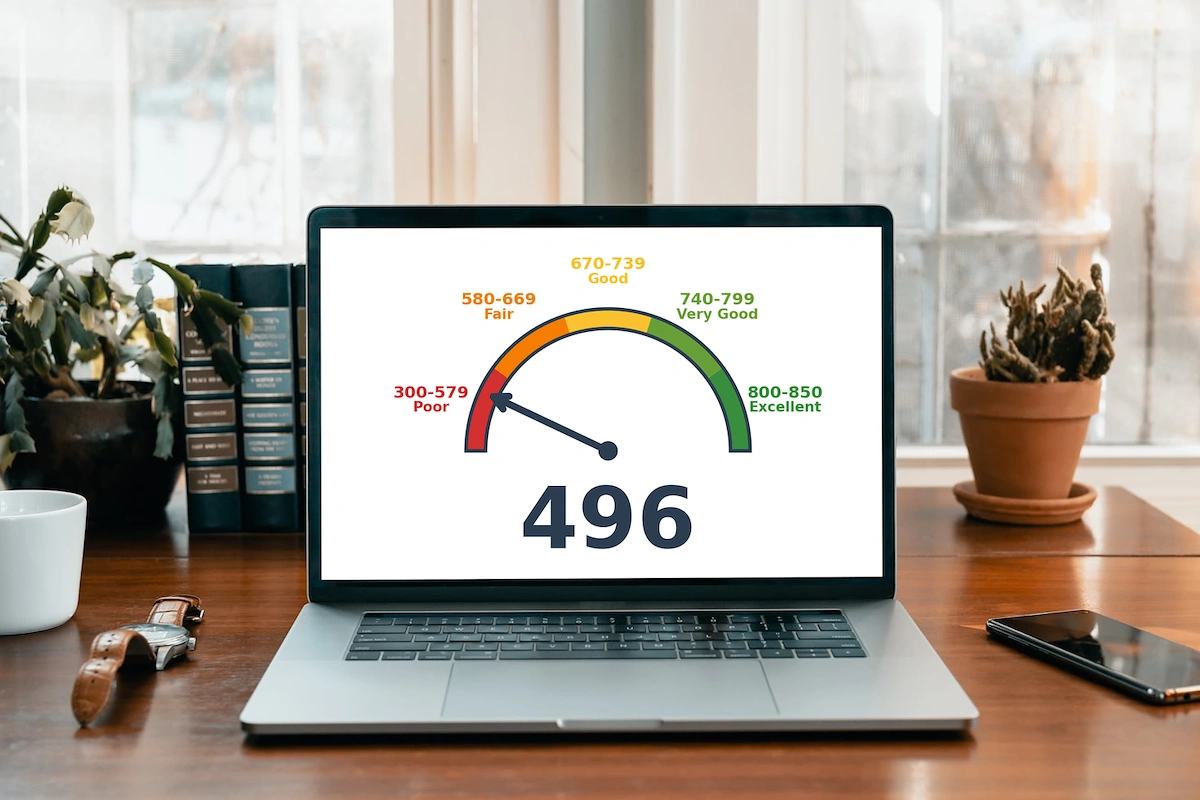
Kudos has partnered with CardRatings and Red Ventures for our coverage of credit card products. Kudos, CardRatings, and Red Ventures may receive a commission from card issuers. Kudos may receive commission from card issuers. Some of the card offers that appear on Kudos are from advertisers and may impact how and where card products appear on the site. Kudos tries to include as many card companies and offers as we are aware of, including offers from issuers that don't pay us, but we may not cover all card companies or all available card offers. You don't have to use our links, but we're grateful when you do!
496 Credit score: What You Need to Know in 2026
July 1, 2025


TL;DR
A 496 credit score is a starting point with considerable opportunity for growth, though it may present some initial hurdles. According to the FICO model, this score is considered to be in the "Poor" credit range.
What Does a 496 Credit Score Mean?
A credit score of 496 falls into the "poor" range of the FICO model, which spans from 300 to 850. Lenders view this score as a sign of high risk, which can significantly impact your financial life. You'll likely face rejections for new credit or, if approved, receive unfavorable terms like very high interest rates. This makes borrowing for major purchases like a car or home both difficult and expensive.
While a 496 score presents challenges, it's not a permanent state. It's a clear snapshot of your current credit health, pointing to areas needing attention. Understanding the factors behind this score is the first step toward rebuilding. Improving your score is an achievable goal that can unlock better financial opportunities down the road.
Who Has a 496 Credit Score?
While a 496 credit score is significantly below the average for any age group, it's helpful to see how scores typically break down across generations. According to 2023 Experian data, there is a clear pattern of credit scores increasing with age:
- Generation Z (ages 18-26): 680
- Millennials (ages 27-42): 690
- Generation X (ages 43-58): 709
- Baby Boomers (ages 59-77): 745
- Silent Generation (ages 78+): 760
Credit Cards With a 496 Credit Score
A credit score of 496 falls into the "poor" credit range, which can significantly hinder your ability to qualify for most traditional credit cards. Lenders view this score as an indicator of high risk, meaning you're likely to face rejections from major card issuers for their more desirable unsecured cards. Your options will probably be limited to products specifically designed for building credit, such as secured credit cards or unsecured cards with high annual fees and interest rates.
Kudos can help you find the right card for your financial situation with tools like its AI-powered Dream Wallet, which analyzes your spending habits to provide personalized recommendations. The platform’s Explore Tool also allows you to search for cards based on specific goals, such as building credit, and matches your preferences against its database of nearly 3,000 cards.
Auto Loans and a 496 Credit Score
A 496 credit score places you in the deep subprime category, which means that while you may still get approved for an auto loan, you will face some of the highest interest rates from lenders. This results in significantly higher monthly payments and a greater total cost over the life of the loan.
According to a 2025 analysis, average rates for new and used car loans break down by credit score as follows:
- Super-prime (781-850): 5.25% for new cars, 7.13% for used cars
- Prime (661-780): 6.87% for new cars, 9.36% for used cars
- Non-prime (601-660): 9.83% for new cars, 13.92% for used cars
- Subprime (501-600): 13.18% for new cars, 18.86% for used cars
- Deep subprime (300-500): 15.77% for new cars, 21.55% for used cars
Mortgages at a 496 Credit Score
Securing a mortgage with a 496 credit score is exceptionally difficult, as it falls below the minimum threshold for most loan programs. Even FHA loans, which are more lenient, typically require a score of at least 500 for consideration with a 10% down payment. According to mortgage requirement guidelines, conventional loans generally start at a 620 score, making them inaccessible. In practice, very few lenders approve mortgages for applicants with credit scores under 600.
If you could find a rare specialty lender willing to work with a 496 score, the loan terms would be costly. You would face significantly higher interest rates, which increases your monthly payment and the total interest paid over the loan's life. Furthermore, you would be required to make a larger down payment and pay higher fees, such as mortgage insurance premiums, to offset the lender's risk.
What's in a Credit Score?
Figuring out what goes into your credit score can feel like trying to solve a complex puzzle, but it generally boils down to a handful of key elements. The most common factors include:
- Your payment history, which tracks whether you pay your bills on time, is the most significant factor.
- Credit utilization, or the amount of credit you're using compared to your total available credit, also plays a major role.
- The length of your credit history demonstrates your experience with managing credit over time.
- Having a healthy mix of different types of credit, such as credit cards and installment loans, can positively impact your score.
- Finally, recent credit inquiries, which occur when you apply for new credit, are also taken into account.
How to Improve Your 496 Credit Score
Improving your credit score is entirely achievable, and with consistent positive behavior, you can see meaningful changes within a few months. Here are four proven methods to begin rebuilding your credit:
- Apply for a secured credit card. Since these cards require a security deposit, they are accessible to those with damaged credit and allow you to build a positive payment history as your activity is reported to the major bureaus.
- Become an authorized user. By being added to the account of a responsible cardholder, their positive payment history and low credit utilization can be added to your credit file and help improve your score.
- Consider a credit-builder loan. These loans are specifically designed to help you establish a record of on-time payments and diversify your credit mix, both of which are beneficial for your score.
- Establish automatic bill payments. Ensuring on-time payments is crucial because payment history is the single most significant factor in your credit score calculation.
Kudos can help you manage your cards and make smarter spending decisions to improve your financial health.
Unlock your extra benefits when you become a Kudos member

Turn your online shopping into even more rewards

Join over 400,000 members simplifying their finances

Editorial Disclosure: Opinions expressed here are those of Kudos alone, not those of any bank, credit card issuer, hotel, airline, or other entity. This content has not been reviewed, approved or otherwise endorsed by any of the entities included within the post.



































.webp)







